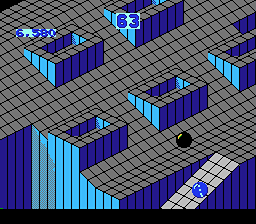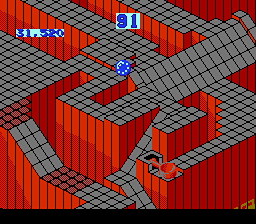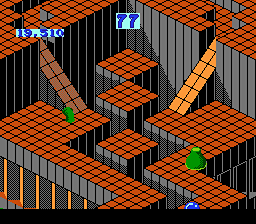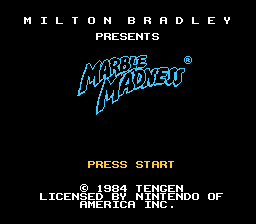
Marble Madness (1989-)
Developer: Atari
Publisher: Milton Bradley
Genre: Puzzle
Marble Madness for the NES was developed by Atari and released in 1989, with Milton Bradley publishing it in North America and Nintendo handling publication in Japan. The game is a home console adaptation of Atari’s original 1984 arcade title, translating the arcade’s innovative physics-based, isometric platforming into the NES environment. This version sought to preserve the challenging marble-control mechanics and inventive level design of the arcade while adapting them to the limitations of the console, making it an early example of a faithful arcade-to-home adaptation.
The game’s premise involves guiding a marble through a series of increasingly difficult obstacle courses, each with a strict time limit. Drawing inspiration from the arcade original, Marble Madness challenges players with ramps, slopes, moving platforms, and hazards while avoiding falling off edges or colliding with enemies. The narrative is minimal, focusing on the action and skill-based gameplay that made the arcade version compelling. The design emphasizes timing, precision, and strategy, giving players a sense of accomplishment for successfully navigating each level.
Gameplay requires careful control of the marble’s speed and direction to traverse intricate courses without falling or being destroyed. Each level presents unique challenges, with hazards increasing in difficulty as players progress. The NES version simplified some of the arcade’s physics but retained the core challenge and pace. The soundtrack features energetic electronic melodies and sound effects that signal jumps, collisions, and level completion, reinforcing the urgency and excitement of the gameplay.
Marble Madness did not have a prequel or a direct NES sequel, but it influenced many later puzzle and precision-based platformers. Promotion highlighted its arcade heritage, challenging gameplay, and distinctive isometric graphics, appealing to fans of the original arcade game as well as newcomers. Reception was generally positive, with critics praising its inventive level design, originality, and visual style, though some noted that the NES controls lacked the fine precision of the arcade. Today, Marble Madness is remembered as a standout NES title and a successful translation of an arcade classic to home consoles.
Images from MobyGames
Buy Marble Madness
Click one of the Ebay or Amazon buttons below to check the latest prices and purchase Marble Madness for the Nintendo Entertainment System.

Related Searches
Marble Madness NES Download
Marble Madness is available to purchase and download from a range of vendors. Always shop around...
Marble Madness NES Manual
Various repositories around the internet have scanned and archived a range of retro manuals. Search now to.....
Marble Madness NES Rom
We don't host or link to rom sites for this game. However, there are many sites out there that may be...
Marble Madness NES Walkthrough
Many sites - particularly YouTube - host a range of walkthrough videos to guide you in your quest to get...
Marble Madness NES Cheats
There are various sites out there that can offer cheat codes for games. Search now to find all available...
Marble Madness NES Controls
This information can often be obtained through the user manual. Alternatively there are many sites out there...
Marble Madness NES Release Date
The initial release date for Marble Madness is stated as March 1989. Other ports of the game may..
Marble Madness NES Review
There are many sites out there that have collated and documented historic reviews of this game. Search now...
Marble Madness Famicom
As a Nintendo Entertainment System release, this game was also likely also available on the Famicom. This....
Marble Madness NES Speedrun
There is now a community of competitive speedrunners who will try and gain the fastest possible time on their....








